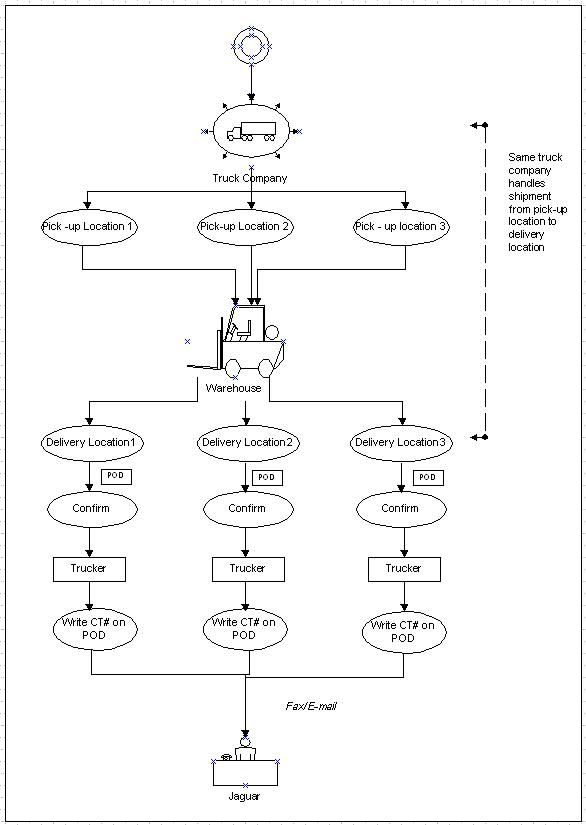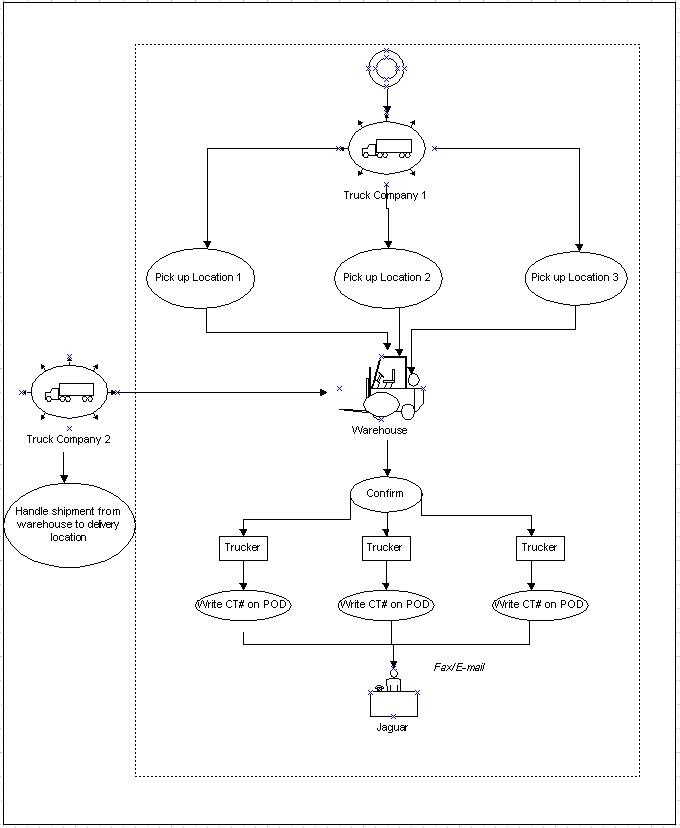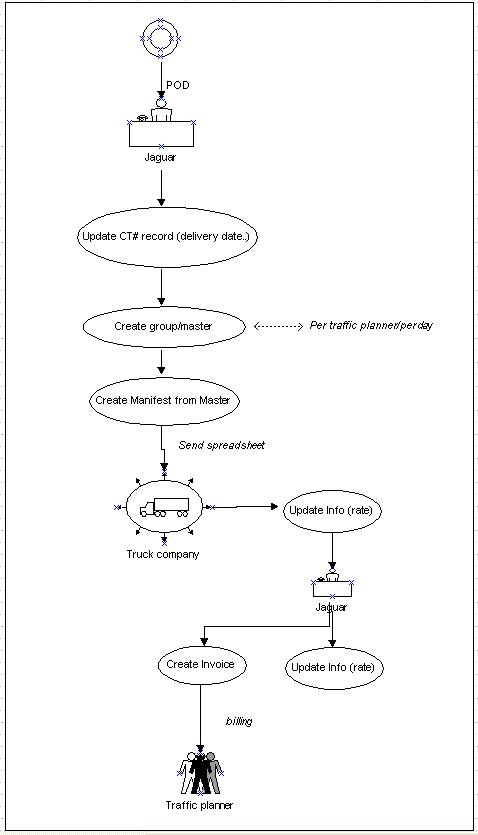Business Process for Arden Trucking Domestic October 2010
From UG
(→Intro) |
(→Use case 1. Shipper created CT from web portal & gets approved by Planner) |
||
| Line 19: | Line 19: | ||
=== Normal Flow of Events === | === Normal Flow of Events === | ||
| - | 1) Traffic planner | + | 1) EA Traffic planner or E.M. traffic planner approves a CT record that shipper created in the web portal |
2) Jaguar operator looks at dashboard to find new shipments approved | 2) Jaguar operator looks at dashboard to find new shipments approved | ||
| Line 25: | Line 25: | ||
NOTE: This is typically done every 15mins to ½ hr | NOTE: This is typically done every 15mins to ½ hr | ||
| - | 3) Jaguar operator updates CT records via Virtual Group with pickup trucker’s company name, estimated pickup date | + | 3) Jaguar operator updates CT records via Virtual Group with pickup trucker’s company name, estimated pickup date. |
| - | + | 4) Jag operator sends out batched e-mail confirmations to the pickup trucker for them to collect todays approved goods the following day | |
| - | + | NOTE: The above 2 steps are done continuously throughout the day | |
| - | + | 4) Jaguar operator follows up, tracks the collection & delivery of the shipment. They update the CT records via virtual group the actual pickup, the delivery trucker & the actual delivery dates. | |
| - | + | NOTE: With this new process, Jaguar Freight will not receive PODs from 99% of the truckers used to deliver the goods as only 1 trucker bills Jaguar Freight directly, while all of the remaining truckers bill EA directly. | |
| - | + | ||
| - | + | ||
| - | + | ||
| - | + | ||
== Use case 2a. Direct Pick-up and deliver (NJ, NY, and CT) == | == Use case 2a. Direct Pick-up and deliver (NJ, NY, and CT) == | ||
Revision as of 21:25, 12 October 2010
Contents |
General
Mantis: http://mantis.jaguarfreight.com/mantis/view.php?id=2228
Intro
This is a part of the NATP and is an updated explanation of their Business Process. To be used for testing purposes and discovery of current workflow to ensure most cases are considered and any bugs.
There is a related workflow already recorded in Wiki, see Business Process for Arden Trucking Domestic.
Summary
There are two JFS operators who handle the majority of routings for the EA domestic trucking shipments; Stacy & Erin. Erin handles LTL freight from the Tri-State to the Tri-State area, including LTL shipments that are going to VA and/or ME by using Jewels Transportation as a pooling point. Stacy handles FTL freight to and from the NE, SE, MW & WC, including all of the small package freight, which is up to 150#. Stacy also handles domestic trucking Canada freight.
Use case 1. Shipper created CT from web portal & gets approved by Planner
Normal Flow of Events
1) EA Traffic planner or E.M. traffic planner approves a CT record that shipper created in the web portal
2) Jaguar operator looks at dashboard to find new shipments approved
NOTE: This is typically done every 15mins to ½ hr
3) Jaguar operator updates CT records via Virtual Group with pickup trucker’s company name, estimated pickup date.
4) Jag operator sends out batched e-mail confirmations to the pickup trucker for them to collect todays approved goods the following day
NOTE: The above 2 steps are done continuously throughout the day
4) Jaguar operator follows up, tracks the collection & delivery of the shipment. They update the CT records via virtual group the actual pickup, the delivery trucker & the actual delivery dates.
NOTE: With this new process, Jaguar Freight will not receive PODs from 99% of the truckers used to deliver the goods as only 1 trucker bills Jaguar Freight directly, while all of the remaining truckers bill EA directly.
Use case 2a. Direct Pick-up and deliver (NJ, NY, and CT)
Normal Flow of Events
1) Truck company received Traffic sheets
2) Trucker goes to pick up shipment from shipper(s); this can be many truckers to pick up shipment from many other shippers in tri-states area
3) Trucker unloads shipments at the warehouse to consolidate
4) Trucker loads shipments and delivers shipment to consignees
5) Consignees receive shipments and give confirmation POD (proof of delivery) document to Trucker
6) Trucker writes CT# reference on POD (CT# must be matched to the CT# that was created by Jaguar operator)
7) Trucker fax/e-mail POD to Jaguar company
NOTE: This case will be billed from pick-up location to delivery location for truck movement
See #Figure 2a. Direct Pick-up and deliver (NJ, NY, and CT)
Figure 2a. Direct Pick-up and deliver (NJ, NY, and CT)
Use case 2b. Consol Pick-up and deliver (VA)
Normal Flow of Events
1) Truck company received Traffic sheets
2) Trucker goes to pick up shipment from shipper(s); this can be many truckers to pick up shipment from many other shippers in tri-states area
3) Trucker unloads shipments at the warehouse to consolidate
3a) A different truck company will handle shipments from the warehouse to consignee
NOTE: Jaguar handles shipments from shippers to warehouse ONLY
4) Shipments get received and confirmed by warehouse people
5) Warehouse people give POD (proof of delivery) to trucker
6) Trucker writes CT# reference on POD (CT# must be matched to the CT# that was created by Jaguar operator)
7) Trucker fax/e-mail POD to Jaguar company
NOTE: This case will be billed from pick-up location to warehouse location for truck movement
See #Figure 2b. Consol Pick-up and deliver (VA)
Figure 2b. Consol Pick-up and deliver (VA)
Use case 3. Bill to truck planner
Normal Flow of Events
1) Jaguar receives POD from Trucker via fax/e-mail
2) Operator updates CT record with delivery date
3) Operator creates CT groups. One group per traffic planner per day. There are 3 planners.
4) Operator creates a master on top of every group
5) Operator creates Trucking Billing Manifest for each master (this can be up to 3 spreadsheet per day; 3 traffic planners)
6) Operator updates rate information
7) Operator sends it to truck company
8) Truck company updates information and sends it back to Jaguar
9) Jaguar adjust number (adding margin) in order to bill the traffic planner(s);
10) Operator creates one pdf invoice and attaches all Trucking Billing Manifest and sends to the client
See #Figure 3. Bill to truck planner
Figure 3. Bill to truck planner




